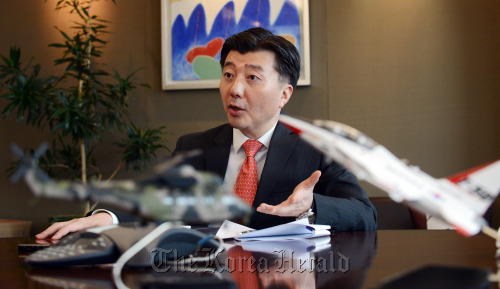CEO aims to reinforce ties with Korean government, businesses, schools
The Korean arm of General Electric, launched in 1976, sees mutual growth with local businesses through the sharing of technologies and management know-how as one of its key missions.
Khang Sung-wook, who took office as the chief executive of GE Korea in January, has vowed to invigorate cooperation with hundreds of local partner firms, build new alliances and boost the company’s reputation.
“GE Korea is a sizeable company with some 1,300 employees and 35 business areas from aircraft engines and gas turbines to finance and health care, but it is questionable whether we get a matching public recognition,” Khang told The Korea Herald last week.
Khang aims to increase GE Korea’s sales by up to fourfold over the next three to five years, and at the same time solidify the company’s ties with the Korean government, businesses and schools.
“Starting with a medical equipment joint venture with Samsung in 1984, GE Korea has contributed toward the nation’s industrial development as a long-term companion,” he said.
 |
Khang Sung-wook (Park Hae-mook/The Korea Herald) |
It transferred GE Energy’s power generation technologies to Korea Heavy Industries and Construction, which is now Doosan Heavy Industries and Construction, supplied key plastic materials for automobiles, and established two successful joint ventures with Hyundai Motor ― Hyundai Capital and Hyundai Card.
GE Korea is also a major partner for Korean companies in EPC (engineering, procurement and construction) projects abroad. A combined-cycle gas turbine power plant in Kuwait built by a consortium of GE and Hyundai Heavy Industries is one such example.
“With GE’s long history of participating in infrastructure projects around the world, we help the Korean companies win orders with us by sharing information and reduce business risks in various developing nations,” Khang said.
“We are running a team called EPC Center of Excellence to provide technical assistance to Korean EPC companies.”
Khang points to GE Korea’s ultrasound diagnostic equipment production plant in Seongnam, Gyeonggi Province, as an example of the company’s sturdy, long-term relations with suppliers.
The plant churns out 30 percent of GE’s ultrasound systems sold worldwide. About 90 percent of the production in Seongnam worth some $90 million annually is exported.
“This is possible because of our strong supply chain. Deliveries and prices are always predictable as we run quality checks on parts made by the suppliers and assemble them,” the CEO said.
“Suppliers that meet our quality standards are invited to GE’s global supplier conference, which opens up new business opportunities for them. We have been doing business with many of our suppliers for more than 20 years.”
The company consults with suppliers in advance when there is a need to cut prices.
In 2010, GE Korea invested $10 million in a nano-fiber manufacturer named Finetex EnE, Inc. which it selected as a partner in a program jointly run with the Korea Trade-Investment Promotion Agency.
To make use of Korea’s strong human resources and IT infrastructure, GE is scheduled to complete in May an energy research and development center in Pangyo, Gyeonggi Province, for development of software to oversee power generating facilities and smart grid technologies.
“GE Energy has already hired about 200 people to work in the center and plans to recruit more,” Khang said.
GE Korea hires about 100 people with work experience each year and 40 college juniors and seniors as interns every six months.
When it comes to human resources, Khang attaches importance to how many of the interns become regular staff and how many women make it to the executive level.
“I think women should take up at least 30 percent of the executive staff,” he said, adding that GE Korea will expand its leadership training program with Ewha Womans University.
The former top executive at Cisco Systems built his career in multinational IT companies such as IBM, Tandem Computers, Compaq and Hewlett-Packard.
By Kim So-hyun (
sophie@heraldcorp.com)
Khang Sung-wook profile
- Took office as chief executive of GE Korea in January 2012.
- Worked at Cisco Systems as president for enterprise and commercial business in Asia Pacific from October 2002 to December 2011.
- Served as general manager of enterprise systems group at Hewlett-Packard Korea, managing director of Compaq’s Korean operations and regional managing director for Tandem Computers’ East Asia operations between 1990 and 2002.
- Started his career as system engineer at IBM in 1985.
- Earned a B.A. in economics from Seoul National University in 1984 and an MBA from the Sloan School of Management at M.I.T. in 1990.








